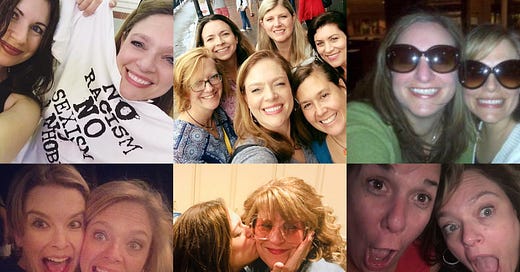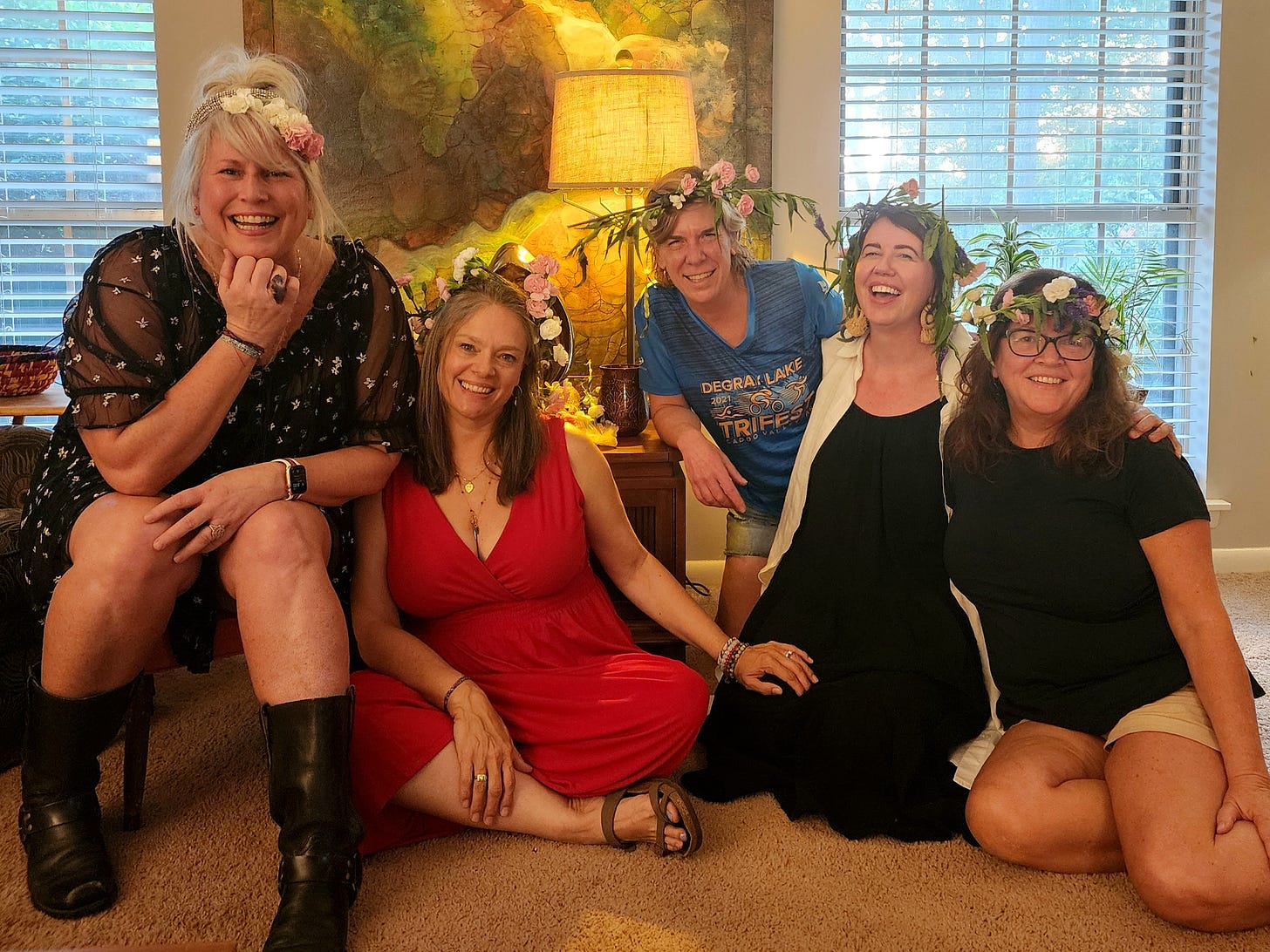There wasn’t one lightning bolt moment. No sudden “before and after” snapshot. My after came slowly—an unraveling that began in whispers, not roars.
I first learned to associate the term "unraveling" with midlife in 2018, thanks to Brené Brown. In her essay on the topic, this is the part that struck me dumb:
“Midlife is not a crisis. Midlife is an unraveling.
By definition, you can’t control or manage an unraveling. You can’t cure the midlife unraveling with control any more than the acquisitions, accomplishments, and alpha-parenting of our thirties cured our deep longing for permission to slow down and be imperfect.
“Midlife is when the universe gently places her hands upon your shoulders, pulls you close, and whispers in your ear:
I’m not screwing around. Time is growing short. There are unexplored adventures ahead of you. You can’t live the rest of your life worried about what other people think. You were born worthy of love and belonging. Courage and daring are coursing through your veins. You were made to live and love with your whole heart. It’s time to show up and be seen.”
There it was: the first tug on the thread.
The second came a few months later, when Dr. Christine Blasey Ford testified before the Senate Judiciary Committee about her nonconsensual encounter with a young Brett Kavanaugh. Like so many women, I watched and wept, remembering similar stories I locked away—stories of questionable decisions, near misses, shame swallowed, silence mistaken for strength.
(Side note: As a boy mom, I don’t believe we should define a man’s worth by his worst teenage moments. However, how a person responds when confronted by someone they have wronged speaks volumes about their character. “I’m sorry” carries immense weight, no matter how late in life the words are spoken. I say this as someone still reckoning with the amends I myself need to make.)
I especially examined my college years—the drinking, smoking, and hooking up that we treated like rites of passage. At my small liberal arts college, all three were expected. The third usually followed the first two, often under the cover of night. My higher power must have been exhausted from protecting me, because my “no” was never ignored. Still, I often found myself numb enough not to care what it took to hold someone’s attention even for one night. My friends and I kept lists of who we’d hooked up with and joked about the “walk of shame” like we weren’t grieving the parts of ourselves we gave away just to feel wanted.
Today, I look back on those years with tenderness for the young woman I was—still in her late teens and early 20s, walking the line between feeling powerful and feeling used. The girl whose 'daddy issues' wrecked relationship after relationship, as she hustled for attention to fill the hole he left behind. I didn’t see the people I hurt in my wake. I ignored the ache in my own body and heart. Bless that baby girl’s heart, as we say in the South.
Above: The women who’ve had a hand in raising me from high school through today. They’ve walked this unraveling journey with me. They know my faults and my mistakes, and they love me anyway, bless their hearts.
That awakening was only the beginning.
In June 2019, I got sober. Not because of a dramatic rock bottom, but because I was tired of numbing what hurt and damaging what mattered.
One morning, I asked my daughter a question—about school, or friends, or boys (I can’t remember now). Her response landed like a punch: “We talked about this last night. If you can’t remember, I’m not telling you again.”
I had been drinking that night. And the night before. And probably the night before that.
Five days later—on the night of my 30th high school reunion—I drained what I believe to be my last vodka tonic. Eschewing AA and other 12-step programs, I cobbled together sobriety with yoga, meditation, journaling, “quit lit,” and an online community called The Luckiest Club.
Six months later, the world shut down.
The pandemic gave me time to sit with hard feelings. Time to read, to journal, to take online workshops, to Zoom with old friends. For better or worse, I had control over which voices entered my home—and which didn’t.
I watched George Floyd’s murder like the rest of the world. But this time, I didn’t look away. I didn’t scroll past. And—most importantly—I didn’t pour a glass of wine to escape.
Instead, I surrendered to unlearning. I followed Black thought leaders on social platforms. I read authors of color. I showed up to hard conversations and listened. I asked myself difficult questions—not to perform allyship, but to scoop out unconscious bias from my marrow. I wanted to be better. Do better. Lead better.
This awakening didn’t stay in one lane. It spilled into my spirit.
I discovered a priestess named Sarah Jenks and her online community of women reclaiming their voices and ancient lineages. I met Mary Magdalene in the pages of a gospel the Church never taught me. And suddenly, I couldn’t unknow the truth: the version of God I was raised with—white, male, ruling from above—had been shaped by men in Rome. My Episcopal upbringing is rich in tradition and meaning, but once I saw the patriarchy woven through it, I couldn’t unsee it. I’m still on this spiritual walkabout, and I look forward to sharing more with you in the coming weeks.
Above: My goofy, little “coven” last June (minus a few who were out of town). We gathered for the summer solstice and made flower wreaths. Then we danced and burned shit.
COVID gave me time to unlearn and recalibrate. Sobriety gave me the courage to feel and reweaving the unraveled threads of my life. And it all continues today, through career challenges, raising five children, caring for six aging parents, and this new cancer journey — the unraveling and the reweaving, in a beautiful, unending spiral.
P.S. If any part of this brought up a memory, a question, or a tug on your own thread—I hope you’ll share it with me. I’m listening.





It’s always so much easier to see what’s happening when we look over our shoulder. The path seems so clear then! I’ve learned not to be afraid, in the unraveling. I’m just floating down the river.